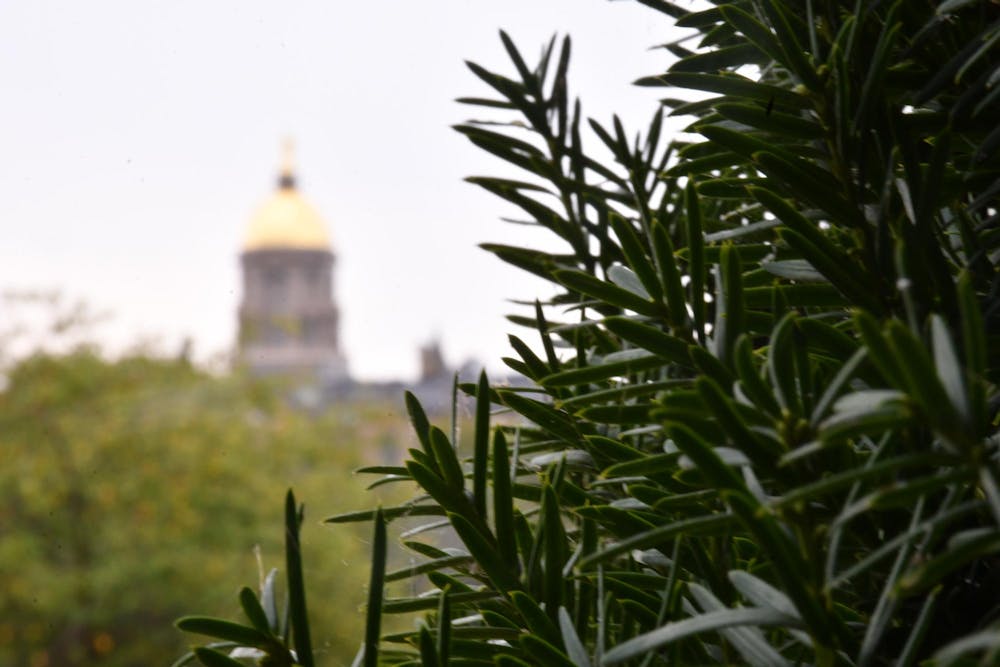Six years ago, I sat in my freshman year theology course, taught by Matt Sciuto, who was something of a legend at my high school. Mr. Sciuto — if frustrated with a student — would halt a lesson, prop one leg on the chair he kept in the front of the room and, raising his voice, lament: “Did you do the reading? Are you really learning?!” I don’t think he meant these to be rhetorical, but nobody ever answered with the honest, “No.” And, if anyone did answer “No,” he would have replied, “Why not?” To which it would have been just as impossible to shamefully reply: “Because I am lazy.” Probably, though, Mr. Sciuto would have respected us more if we had answered honestly.
He drank water out of a green, glass bottle, which curved into the figure of Buddha where its neck began, though nothing else about him suggested an interest in the East. On quizzes, he liked to sprinkle in questions like, “If you are assigned pages 5-15, how many pages must you read?” His favorite word was metanoia, meaning a radical change of mind and heart. He often told us he was trying not to give us a few fish for the day but to teach us how to fish, so that we could forever feed ourselves. He taught us how to learn.
Today, I am still learning, and I am still learning how to learn. Amidst my studies, a certain phrase from Mr. Sciuto’s class still resounds in my head.
“One day,” Mr. Sciuto began, “a student turned in his quiz with the letters JGTBH. written at the top. I couldn’t figure out what they meant. Finally, I asked him and he said, ‘just glad to be here.’” The phrase speaks for itself, but I got the sense from Mr. Sciuto that the student was expressing gratitude as an antidote to the sometimes-competitive and often-stressful environment of my high school.
How much more fitting is this phrase at Notre Dame. Didn’t we all arrive on campus for Welcome Weekend with this attitude — just grateful to have a room and an ID at a place where nine others wanted the same spot so badly but were excluded? Weren’t we enamored by the plentiful dining hall food, enthralled by the Golden Dome, hyped for every game day and so infinitely thankful at the Grotto? I hope this still describes many of you first-years, but does this zeal persist for us upperclassmen?
Sometimes, probably, but sometimes not. We now have a little dirt on this place. Dining hall options seem less appetizing, maybe we notice the Dome’s blemishes (even after being regilded), dorm washing machines break, our professors give poor lectures and unfair exams, we lose to Marshall and NIU (and now boo at home games), we struggle with classes and just get by lifting our workload. And so, we have two sets of eyes on this place we call home — fresh eyes, for which all seems to glow, and worn eyes, which often see through this luster. Now I ask: which set of eyes sees this place more truly? I answer: neither.
Fresh eyes see truly with their spirit but, in fact, are blind to many realities. Worn eyes see clearly the reality, but are clouded by a muddled spirit. He sees truly who sees the realities with worn eyes but maintains the spirit of fresh eyes. Then, his vision is neither intoxicated by eagerness nor blurred by (justifiable) annoyances, but is sharpened by a resolute gladness.
Being “just glad to be here” (JGTBH), I have found, requires living more in this present moment at this particular place. We could add ‘just glad to be here right now,’ but that is less catchy and also redundant. For gladness always comes in and from the present. The infinitive ‘to be’ is not perfect or future tense, but present tense. The modifier ‘just’ is an admission of a simple desire for only present goods. In short, to be JGTBH is to be content, and to be content is to rest from frantically trying to make the future better and to enjoy the present good things in front of your nose.
For me, it is hard being content because I can always see a way to make things better. I can always set another goal and start working again to achieve it. The trouble is that my gladness becomes contingent on whether I get what I want. Being JGTBH means taking a step back, lifting this contingency and saying, “You know what? I am happy no matter what. I’m just glad to be here.” I have also found that this statement requires trust — trust that the future will work itself out or that somebody is guiding you and has a plan for you. If there were no Good Shepherd, then our gratitude would be in vain, and we would prove foolish, negligent and impractical for our solace in the present.
I recently realized an alternate meaning to JGTBH. At first, I took ‘here’ to mean my high school, and now I take it to mean Notre Dame. But ‘here’ can also mean the earth, this world. JGTBH could mean ‘just glad to be alive.’ If we could really mean it, wouldn’t that be a beautiful thought and a beautiful set of eyes?
Richard Taylor is a senior from St. Louis living in Keenan Hall. He studies physics and also has an interest in theology. He encourages all readers to send reactions, reflections or refutations to rtaylo23@nd.edu.










